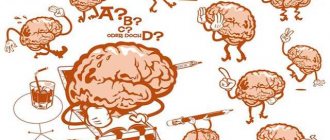What is memory?
In psychology, memory is the complex of human cognitive abilities combined with the ability to remember, accumulate and reproduce information. This means that any information is initially accumulated in the brain, then it is stored in it, which allows its further reproduction. The final process is awareness of information, skills, or actions. Reproduction occurs automatically, but this requires repeated repetition of specific information.
Classification of types of memory
Human memory is not fully understood. But now we can say with confidence how its mechanism works:
- Memorization;
- Preservation;
- Reproduction upon recognition;
- Forgetting.
There are two types of memorizing information: voluntary and involuntary. Voluntary memorization is special. This includes cramming poetry, historical dates, and mathematical formulas. In this case, motivation plays a big role. Involuntary memory is quite unpredictable. The child remembers what he saw, heard, touched. Some information ends up in the long-term memory section, while other information is destroyed because it is not needed and the child does not use it. When memorizing, the material is determined by a special structure of the brain - engrams.
There are two types of information storage: dynamic and static. Dynamic storage refers to short-term memory, static storage refers to long-term memory. The latter type is important for a child’s learning. Because he needs to remember important material in class, then return to it in exams, and supplement it when doing homework.
Forgetting unnecessary information is just as important as remembering important information. Forgetting is a procedure for destroying neural connections. The baby’s psyche needs it to avoid overload.
As mental processes become tense, memory is divided into: emotional, motor, figurative and verbal-logical. The first type of memory that a child begins to develop is motor memory. With its help, the baby learns to control his body. Next comes emotional memory. Thanks to her, the baby begins to recognize his parents by face and voice. The baby will not smile at strangers. Figurative memory appears even later. This includes memorizing taste, touch, and images. In addition, associations are formed, with the help of which the memorization process is easier. Verbal-logical memory is the last to develop. She helps the child formulate his thoughts and turn them into words.
Children's memory has its own characteristics. For example, girls develop visual and long-term memory faster and better. And for boys - motor skills. In addition, boys remember numbers better.
Age characteristics
At each stage of memory development, preschoolers experience dramatic changes in their ability to memorize and reproduce information. Conventionally, in preschool age, 4 such stages are defined:
- Children under one year of age: motor memory develops, which manifests itself in the first conditioned reflexes. In the first year of life, the child remembers movements and repeats them. Memorization is more effective if learning is accompanied by vivid, emotional action.
- Age from 1 to 2 years: during this period, the baby’s central nervous system actively develops, as a result of which the volume of memorized information and its strength increases. The child recognizes close and dear people, he begins to walk, and his figurative memory develops. The first conscious memories are tied to this age period.
- Age 2-4 years: mechanical memory is actively developing, but after two years the child begins to build a logical chain, remembers words, and develops basic motor skills.
- Age 4-6 years: involuntary memorization predominates. Typically, a child at this age remembers information that turned out to be interesting, exciting, and exciting. This happens regardless of whether the preschooler wants to remember this information.
How to develop auditory memory?
- Play a game similar to the famous "snowball". Come up with a sentence and take turns repeating it and adding something new. For example: “I sing.” – “I sing a song” – “I sing a song loudly”, etc.
- "Repeat after me". Tap the musical motif on the table with a stick and let the child try to repeat it.
- "Words". Name 10 words and ask to list the ones you remember. To test long-term memory, do the task again after some time. Do the same with numbers or colors.
- "Remember a couple." The game is similar to the previous one, only the words are presented in pairs. Then invite your child to remember the second word for the named one.
- Also encourage preschool-age children to learn poetry. Start with easy short poems, gradually making the task more difficult.
- Songs are a great help to develop auditory memory; by learning them, the baby remembers both the words and the melody.
Memory formation from 3 to 6 years
Parents need to know how to develop memory in children. During this period of time there is a productive development of attention. The baby effectively and easily learns important material for him, small poems. He tries to set the task himself and achieves it. This is a great age to improve tactile memory and start learning foreign languages. So how can you improve memory performance in a 6-year-old child?
Offer games that develop memory. For example, put various objects on the countertop, tell your son or daughter that he must remember the order and quantity of them, and then rearrange them and remove something completely. At this time, the child closes his eyes, and after your movements he opens them and tries to guess what has changed. Start learning words of a foreign language by matching them with various images and words of your native language.
Development of emotional memory in adults
It also makes sense for adults to develop the emotional component of their personality.
This will definitely be useful both for professional activities and in personal life. Here are some proven techniques for developing emotional memory in adults: Make it a habit to keep a journal. This is a very good way to develop emotional memory. Do it regularly. Write down your feelings, emotions, thoughts in a diary. By re-reading it after a certain time, you can feel your feelings again, analyze them and your actions. Practice meditation. To perform the technique, you need to mentally transport yourself to a certain moment in the past when you experienced strong emotions, and try to feel them again. For example, think back to your first date. Immerse yourself in the sensations you previously experienced. To do this, sit comfortably on a chair or sofa, close your eyes and imagine a process that causes pleasant sensations. For example, imagine how you feast on your favorite dish, while trying to feel its taste and aroma. Analyze the feelings arising in your subconscious
Concentrate on various, even minor events, and try to understand how you feel when they happen and why. During the analysis process, try to separate feelings and emotions. Bibliotherapy
This is the most popular technique for creating a positive emotional state by reading a properly selected book. While reading a work of fiction, you are immersed in the events described and experience the feelings and emotions of the characters.
Good luck to you in self-knowledge and self-development. We strive to ensure that our memory improvement exercises help you develop your memory.
Memory formation from 10 to 14 years
A 10-year-old child begins the period of highest development of logic and memory. It is worth focusing on tasks that are aimed at further improving attention and intellectual abilities. A 12-year-old child should read a lot of books, play with classmates, and draw. But the time spent on a laptop and phone should be reduced.
Sports activities help improve and develop memory. If a child exercises physically, the body absorbs oxygen faster, which causes the brain to work faster.
Try to diversify the load in every possible way. If your son or daughter has no desire to play sports, send him to a music school or sign him up for additional intellectual classes. For example, mental arithmetic. This is a unique technique based on working with the ancient abacus - the abacus. Mental arithmetic, first of all, improves and trains memory, including photographic memory. Don’t think that your baby will only learn quick mental calculations. Although the program has the word “arithmetic” in its name, the skills your son or daughter has acquired will be useful in any school specialty.
Recommendations from experts
Psychology knows many ways to effectively improve children's memory, taking into account an individual approach to the child. Start with easier tasks. When the child understands all the instructions, you can slowly increase the complexity of the training. Stimulate your child with prizes, introduce competitive and playful moments. Come up with games that will involve all family members.
Don’t worry or despair if your child doesn’t succeed in everything. Take his mood into account and add new tasks.
Be sure to do breathing exercises with your children to help relieve excess bodily tension and saturate the brain with oxygen. Make sure your child follows the daily routine. He must sleep well to regain his strength. Provide your baby with adequate nutrition. All trace elements and vitamins that are beneficial for brain function must be absorbed by the body in sufficient quantities.
What can slow down or weaken the development of a child’s memory and attention?
Excessive passion for cartoons and computer games. The fact is that frequent flashing of pictures on a TV or computer screen has a negative effect on the baby’s nervous system, as a result, attention becomes scattered and the child’s memory weakens. It is advisable to limit such pastimes for children so that they do not develop unnecessary addictions and learning problems in the future.
It is necessary to develop your child’s memory from childhood. When he is 7 years old, a young schoolchild can be enrolled in the Memorica course at the SMARTUM Academy for the Development of Intelligence. After training, the baby will be able to control all the processes of his memory, he will have well-developed imaginative thinking, and he will learn to systematize information. In addition, studying at school will turn into an entertaining adventure for him, because he will memorize any material easily and quickly, and perceive new sciences with interest.









